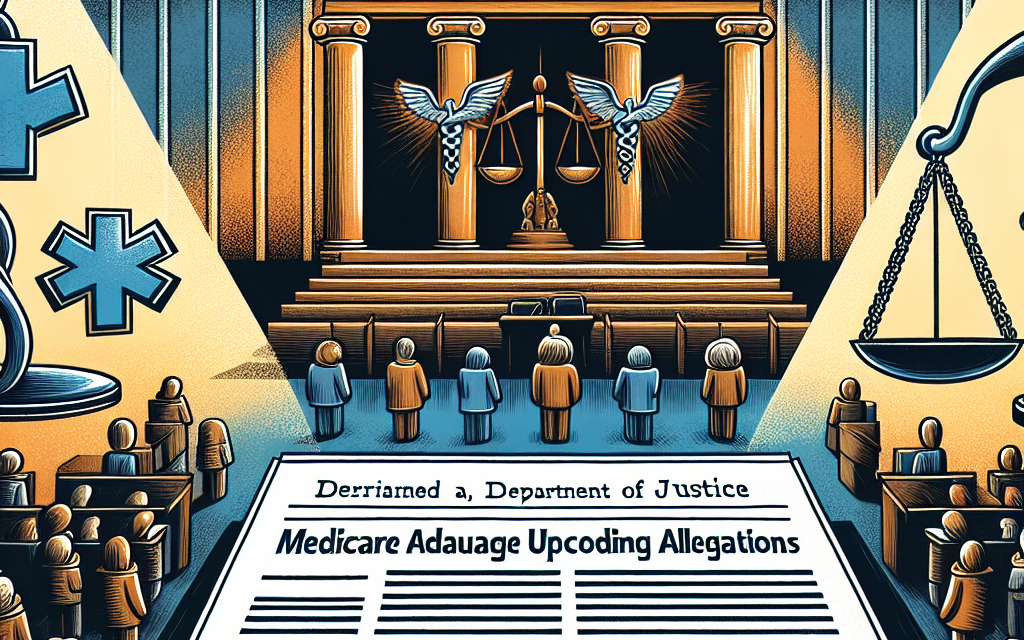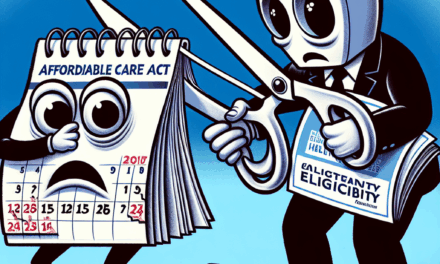Independent Health Reaches Settlement with Justice Department Over Medicare Advantage Upcoding Allegations
The recent settlement between Independent Health and the U.S. Department of Justice (DOJ) has brought to light significant issues surrounding Medicare Advantage plans and the practice of upcoding. This article delves into the implications of this settlement, the nature of upcoding, the regulatory environment surrounding Medicare Advantage, and the broader impact on healthcare providers and beneficiaries. By examining these facets, we aim to provide a comprehensive understanding of the situation and its ramifications for the healthcare landscape.
Understanding Upcoding in Medicare Advantage
Upcoding refers to the practice of billing for a higher level of service than what was actually provided, often to receive higher reimbursement rates from Medicare. This practice can lead to inflated costs for the Medicare program and can undermine the integrity of healthcare delivery.
In the context of Medicare Advantage, upcoding typically occurs when healthcare providers or insurers assign more severe diagnoses to patients than they actually have. This can result in increased payments from Medicare, as reimbursement rates are often tied to the severity of a patient’s condition. The DOJ’s allegations against Independent Health centered around this very issue, claiming that the organization had engaged in systematic upcoding practices.
- Financial Incentives: The financial structure of Medicare Advantage plans incentivizes providers to maximize their reimbursement rates. This can lead to a culture where upcoding becomes a common practice, as organizations seek to enhance their revenue streams.
- Impact on Patient Care: Upcoding can distort the true picture of patient health, leading to misallocation of resources and potentially compromising patient care. When providers focus on maximizing reimbursements, the quality of care may suffer.
- Legal Ramifications: Engaging in upcoding can lead to severe legal consequences, including hefty fines and settlements, as seen in the case of Independent Health. The DOJ actively pursues organizations that engage in fraudulent billing practices.
- Regulatory Oversight: The Centers for Medicare & Medicaid Services (CMS) has implemented various measures to combat upcoding, including audits and risk adjustment models designed to ensure accurate coding practices.
- Ethical Considerations: The ethical implications of upcoding are significant. Healthcare providers have a responsibility to ensure that their billing practices reflect the true nature of the services provided, maintaining trust with patients and the public.
The Settlement: Key Details and Implications
The settlement reached between Independent Health and the DOJ involved a substantial financial agreement, with Independent Health agreeing to pay millions to resolve the allegations. This settlement is part of a broader trend where the DOJ is cracking down on fraudulent practices within Medicare Advantage plans.
As part of the settlement, Independent Health did not admit to any wrongdoing, which is a common stipulation in such agreements. However, the financial implications are significant, as the organization must now allocate resources to cover the settlement costs, which could impact its operations and services.
- Financial Impact: The settlement amount can strain the financial resources of Independent Health, potentially leading to cuts in services or increased premiums for beneficiaries.
- Reputational Damage: Settling allegations of upcoding can tarnish an organization’s reputation, leading to a loss of trust among beneficiaries and stakeholders.
- Increased Scrutiny: Following the settlement, Independent Health may face increased scrutiny from regulators and auditors, leading to more rigorous oversight of its billing practices.
- Changes in Practices: The settlement may prompt Independent Health to reevaluate its coding and billing practices, implementing new training and compliance measures to prevent future issues.
- Broader Industry Impact: This case may serve as a warning to other Medicare Advantage providers, encouraging them to review their practices and ensure compliance with federal regulations.
The Regulatory Landscape of Medicare Advantage
The regulatory environment surrounding Medicare Advantage is complex and constantly evolving. The Centers for Medicare & Medicaid Services (CMS) plays a crucial role in overseeing these plans, implementing regulations designed to ensure that beneficiaries receive appropriate care while preventing fraud and abuse.
CMS employs various strategies to monitor and regulate Medicare Advantage plans, including risk adjustment models, audits, and compliance reviews. These measures are intended to ensure that providers accurately report patient diagnoses and that reimbursement rates reflect the true cost of care.
- Risk Adjustment Models: CMS uses risk adjustment models to determine reimbursement rates based on the health status of beneficiaries. Accurate coding is essential for these models to function effectively, as inflated diagnoses can lead to overpayments.
- Audits and Compliance Reviews: CMS conducts regular audits of Medicare Advantage plans to identify potential instances of upcoding and other fraudulent practices. These audits can result in significant financial penalties for organizations found to be in violation of regulations.
- Education and Training: CMS provides resources and training for healthcare providers to ensure they understand proper coding practices and the importance of compliance. This education is vital in preventing unintentional errors that could lead to allegations of upcoding.
- Collaboration with Law Enforcement: CMS collaborates with the DOJ and other law enforcement agencies to investigate and prosecute cases of fraud within Medicare Advantage. This partnership enhances the government’s ability to combat fraudulent practices effectively.
- Future Regulatory Changes: As the healthcare landscape evolves, CMS may implement new regulations to address emerging issues within Medicare Advantage. Providers must stay informed about these changes to ensure compliance and avoid potential legal ramifications.
Impact on Healthcare Providers and Beneficiaries
The settlement between Independent Health and the DOJ has far-reaching implications for both healthcare providers and beneficiaries. For providers, the case serves as a cautionary tale about the importance of compliance and ethical billing practices. For beneficiaries, it raises concerns about the integrity of the Medicare Advantage program and the quality of care they receive.
Healthcare providers must navigate a complex landscape of regulations and reimbursement structures, making it essential to prioritize compliance and ethical practices. The consequences of failing to do so can be severe, as demonstrated by the Independent Health case.
- Compliance Challenges: Providers face ongoing challenges in ensuring compliance with Medicare regulations. The complexity of coding and billing can lead to unintentional errors, which may result in allegations of upcoding.
- Quality of Care Concerns: The focus on maximizing reimbursements can lead to a misalignment between financial incentives and patient care. Providers must balance the need for revenue with their responsibility to deliver high-quality care.
- Beneficiary Trust: Allegations of upcoding can erode trust between beneficiaries and their healthcare providers. Patients may become wary of the motivations behind their care, leading to decreased satisfaction and engagement.
- Financial Implications for Beneficiaries: Settlements and fines imposed on healthcare organizations can lead to increased costs for beneficiaries, including higher premiums and out-of-pocket expenses.
- Future of Medicare Advantage: The ongoing scrutiny of Medicare Advantage plans may lead to changes in how these programs operate, potentially impacting the availability and quality of services for beneficiaries.
Conclusion: Key Takeaways and Future Considerations
The settlement between Independent Health and the DOJ highlights critical issues surrounding upcoding in Medicare Advantage plans. As the healthcare landscape continues to evolve, it is essential for providers to prioritize compliance and ethical billing practices to maintain the integrity of the system.
For beneficiaries, the case serves as a reminder of the importance of transparency and accountability within the Medicare Advantage program. As the DOJ and CMS ramp up their efforts to combat fraud and abuse, healthcare organizations must remain vigilant in their coding practices to avoid legal repercussions.
Ultimately, the Independent Health case underscores the need for ongoing education, training, and collaboration among healthcare providers, regulators, and law enforcement agencies. By working together, stakeholders can help ensure that Medicare Advantage remains a viable and trustworthy option for beneficiaries, providing them with the care they need while safeguarding taxpayer dollars.
As we look to the future, it will be crucial for all parties involved to stay informed about regulatory changes and best practices in coding and billing. By fostering a culture of compliance and ethical behavior, the healthcare industry can work towards a more transparent and effective Medicare Advantage program that benefits everyone involved.





